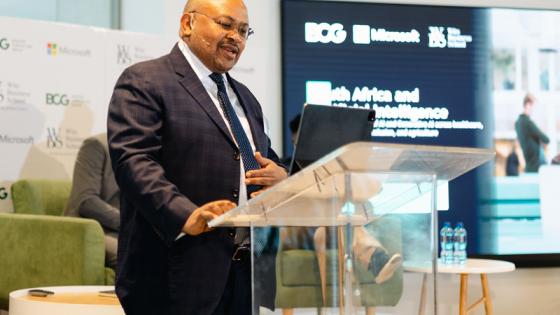South Africa set to gain societal benefits through AI
Wits Business School (WBS) recently partnered with the Boston Consulting Group (BCG) and Microsoft South Africa to produce a new report on the societal benefits of Artificial Intelligence (AI) and generative AI for South Africa.
Generative AI, although still in its early stages, is maturing rapidly and is on track to become one of the most transformative technologies of our time.
“AI represents a novel class of technologies that, notwithstanding many inherent challenges, immediately offers us opportunities to tackle very real problems locally, in tangible ways,” says Dr Martin Bekker from the School of Electrical and Information Engineering, Wits University.
The report considers the potential impact of AI across four key sectors: healthcare, education, financial inclusion, and agriculture.

Speaking at the launch of the report, Prof Maurice Radebe, Head and Director of WBS, said: “This is an important step in opening up the conversation on the potential of AI to reshape the future of South Africa. We are honoured to have partnered with BCG and Microsoft on this collaborative project that brought together some of the of the brightest minds and leading experts in the field.”
In examining use cases for South Africa, the report identifies a number of ways in which AI could make a transformative contribution to easing societal difficulties.
In the healthcare sector, this can include freeing up administrative time for doctors and nurses by transcribing and summarising consultations and automatically updating patient files or serving as a 24/7 health-education resource assisting with disseminating alerts and regular advice, regularly and in various languages.
Given the real challenges faced in the education sector locally, the benefits of AI in providing access to quality education is a game changer. Through natural language processing, AI-powered tutors can assist learners with better access to resources by making sense of their questions and navigating intricate knowledge repositories to find the relevant information, mitigating teacher shortages, especially in public schools.
Expanding financial inclusion provides a backdrop for AI to make financial services more accessible to customers; support under-banked people through a conversational chatbot and expedite the drafting of legal documents. Furthermore, AI enables engagement with clients in their native languages, helping them gain access to essential financial literacy and services.
Agriculture is a pivotal industry in South Africa and contributes to both GDP and exports, but climate change and under-productivity present significant challenges. By using sensors, drones and satellites, farmers can collect real-time data on their crops and when analysed by AI algorithms, maximise crop yields and determine optimal planting times.
Speakers at the launch, which included Nihmal Marrie, Managing Director and Partner at BCG and Ayanda Ngcebetsha, Director: Data & AI Commercial Solutions at Microsoft South Africa, agreed that, while AI provides many benefits to businesses, governments and individuals, there are also associated risks, that cannot be ignored.
“We need to exercise caution when we talk about AI because we need to understand that AI is a powerful tool, a technology that complements and enhances human capabilities. If we do not do this, we risk instilling fear about its potential to replace humans.
“Therefore, we need to take a collaborative approach to AI, where its best use cases emerge when combined with the unique strengths of human intelligence,” said Prof Radebe.

